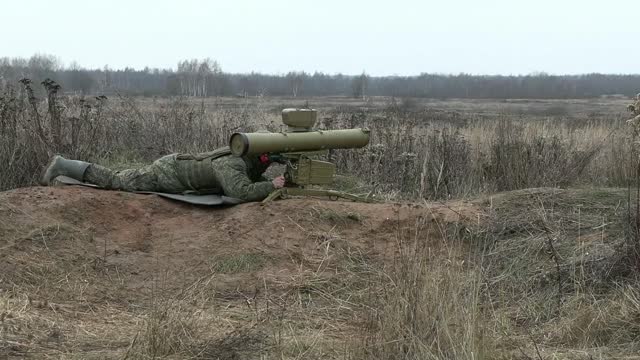Premium Only Content

Russia Shows Mobilised Soldiers Using 'Fagot' ATGM To Pummel Mock Targets
These images purport to show mobilised Russian soldiers using a 'Fagot' anti-tank guided missile system to pummel mock targets during training in Russia's enclave of Kaliningrad.
The footage shows the Russian soldier setting up the weapon system before an instructor can be seen explaining to the mobilised troops how to use it.
The weapon can then be seen being used by one of the soldiers, apparently hitting a target in the distance. Another rocket can be seen being fired as troops can be heard showing.
A number of rockets can subsequently be seen being fired before the footage ends.
The images were obtained from the Russian Ministry of Defence (MoD) on Monday, 5th December, along with a statement claiming: "In the Kaliningrad region, at the training ground of the Baltic Fleet (BF), mobilised servicemen performed live firing from Fagot man-portable anti-tank missile systems (ATGM).
"They fired at various distances at fixed targets imitating enemy military equipment.
"In addition, anti-tank crews worked out reconnaissance of targets, the use of optical instruments, timely change of positions, and preparation of anti-tank systems for firing. Special attention was paid to the camouflage of firing points.
"To successfully complete the training tasks, the calculation numbers took into account external factors and terrain features.
"All fire training classes are conducted under the guidance of instructors participating in hostilities and are organised taking into account the experience of a special military operation."
We have not been able to independently verify the claims or the footage.
The 9K111 Fagot (which means "bassoon" in Russian) is a second-generation tube-launched semi-automatic wire-guided anti-tank missile system first used by the Soviet Union in 1970.
Russia invaded Ukraine on 24th February in what the Kremlin is still calling a "special military operation". Today marks the 285th day of the war.
The General Staff of the Armed Forces of Ukraine reported that between 24th February and 5th December, Russia had lost about 91,690 personnel, 2,924 tanks, 5,900 armoured combat vehicles, 1,914 artillery units, 395 multiple launch rocket systems, 211 air defence systems, 281 warplanes, 264 helicopters, 1,582 drones, 531 cruise missiles, 16 warships, 4,497 motor vehicles and fuel tankers, and 163 units of special equipment.
Russia has claimed that its casualties have been much lower but provides infrequent updates on its latest figures.
Avril Haines, the United States Director of National Intelligence, has said that Russian President Vladimir Putin is now “better informed” about the challenges his army is facing in Ukraine.
It had previously been assessed that Putin was being shielded by his inner circle from the worst news about his troops’ performance in Ukraine.
Haines said that Putin was “becoming more informed of the challenges that the military faces.”
Haines also said that there will likely be a “reduced tempo” in fighting over the winter, adding: “Most of the fighting right now around Bakhmut and the Donetsk area has slowed down with the withdrawal of Russia from the western Kherson area to the east of the river. And we expect that’s likely to be what we see in the coming months.”
There is ongoing heavy fighting near the key town of Bakhmut, in the Donetsk region of eastern Ukraine, where the Russian military has struggled for the last six months to make any substantial progress.
Ukrainian forces are also said to be making headway on the east bank of the Dnipro River after taking control of the city of Kherson.
Russia has also been intensifying its artillery attacks on the Kherson region since abandoning it and withdrawing to the east bank of the river.
There is reportedly a draft resolution circulating at the United Nations proposing a Nuremberg-style tribunal to hold Moscow to account for its crimes in Ukraine.
Rob Malley, the US special envoy on Iran, has said that the Islamic Republic has locked itself into a “vicious cycle” regarding the ongoing protests gripping the country and over providing Russia with weapons.
He said: “The more Iran represses, the more there will be sanctions; the more there are sanctions, the more Iran feels isolated.”
Malley added: “The more isolated they feel, the more they turn to Russia; the more they turn to Russia, the more sanctions there will be, the more the climate deteriorates, the less likely there will be nuclear diplomacy. So it is true right now the vicious cycles are all self-reinforcing.”
Some 500 localities in Ukraine remained without electricity on Sunday after weeks of Russian missile strikes targeting the country’s power grid, according to the Ukrainian Interior Ministry.
-
 1:02:40
1:02:40
Man in America
9 hours agoThe Elites Are Losing Their War on Our Children w/ Robert Bortins
26.9K7 -
 3:30:43
3:30:43
I_Came_With_Fire_Podcast
12 hours agoGovt' Shutdowns, VA Scandals, MORE Drones, Syrian Strikes and staged rescues , and The DHS!
60.6K22 -
 56:55
56:55
The StoneZONE with Roger Stone
7 hours agoTrump Should Sue Billionaire Governor JB Pritzker for Calling Him a Rapist | The StoneZONE
54.9K10 -
 59:21
59:21
Adam Does Movies
7 hours ago $1.70 earnedMore Reboots + A Good Netflix Movie + Disney Live-Action Rant - LIVE
35.5K1 -
 36:28
36:28
TheTapeLibrary
16 hours ago $10.33 earnedThe Disturbing True Horror of the Hexham Heads
63K6 -
 6:08:00
6:08:00
JdaDelete
1 day ago $2.44 earnedHalo MCC with the Rumble Spartans 💥
42.1K7 -
 3:52:22
3:52:22
Edge of Wonder
10 hours agoChristmas Mandela Effects, UFO Drone Updates & Holiday Government Shake-Ups
37.5K13 -
 1:37:36
1:37:36
Mally_Mouse
9 hours agoLet's Play!! -- Friends Friday!
42.2K1 -
 57:45
57:45
LFA TV
1 day agoObama’s Fake World Comes Crashing Down | Trumpet Daily 12.20.24 7PM EST
38K16 -
 1:27:17
1:27:17
2 MIKES LIVE
8 hours ago2 MIKES LIVE #158 Government Shutdown Looms and Games!
33K10